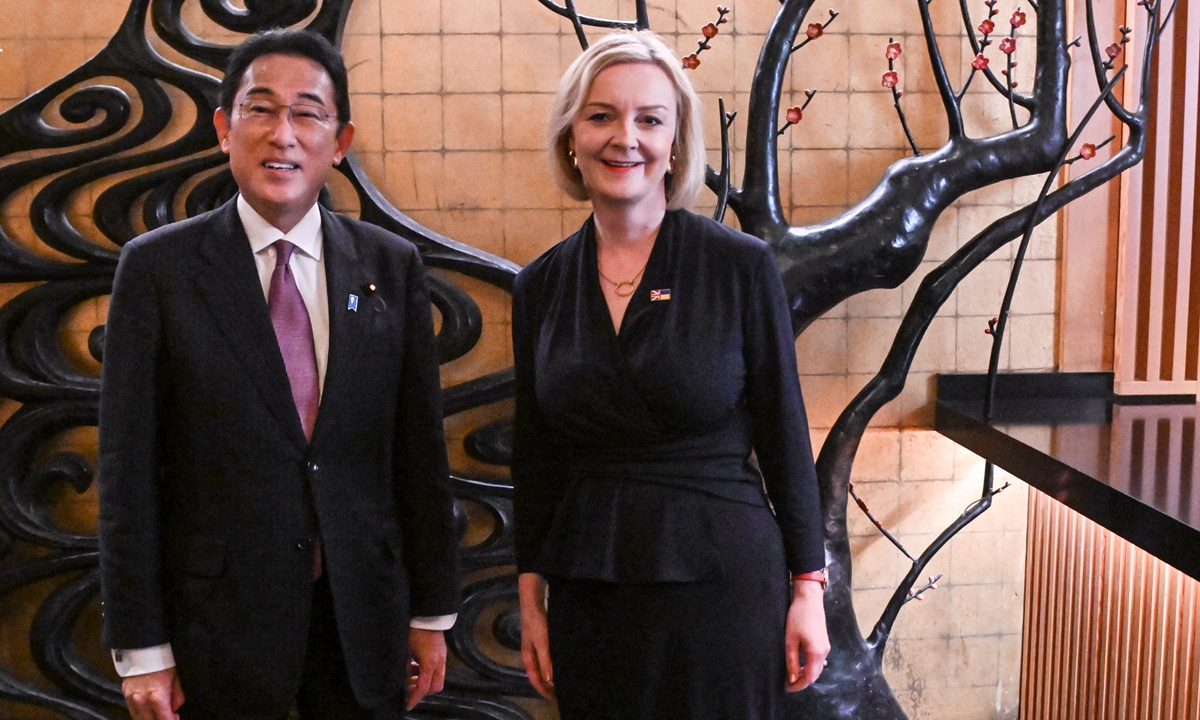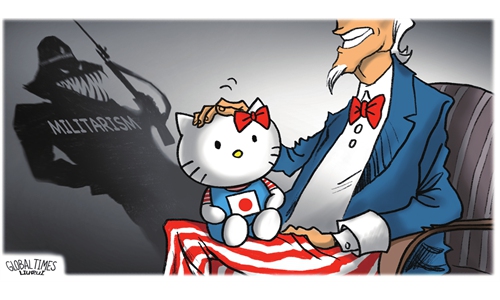
British Prime Minister Liz Truss meets with Japan's Prime Minister Fumio Kishida ahead of a bilateral meeting during their visit to the US to attend the 77th UN General Assembly, on September 20, 2022 in New York City. Photo: AFP
Top leaders of both the UK and Japan seem to have repeated the playbook between the two countries from 120 years ago - jointly dealing with China. In 1902, Britain and Japan signed the Anglo-Japanese Treaty of Alliance, in a bid to serve the purposes including safeguarding their respective interests in China.
(Un)fortunately, as both the international environment and China's strength are far from what they were 120 years ago, their petty tricks will not succeed.
During the first meeting between UK Prime Minister Liz Truss and her Japanese counterpart Fumio Kishida on the sidelines of the ongoing UN General Assembly, the UK and Japan agreed to cooperate in addressing "the strategic threat posed by China," according to media report.
"Such rhetoric is an anticipated response against the backdrop that creating various geopolitics-based small circles is 'popular' in the West," said Yang Xiyu, a senior research fellow at the China Institute of International Studies, "Led by the US, NATO, which French President Emmanuel Macron described as 'brain dead' in 2019, is exploiting the ongoing Ukraine crisis to revive itself and attempting to extend its tentacles to Asia-Pacific and to become a globalized bloc. Japan and the UK are two countries particularly proactive in pushing the NATO to achieve its globalization."
Britain, which is still immersed in the long-gone glory of the "empire on which the sun never sets," tends to believe it can still make a difference in international affairs. Especially after the Brexit, London's strategic ambition is to become a major global power. As a result, the UK seems to have made greater efforts to push a globalized NATO, so as to prove its strategic presence and boost its global influence and status, noted Yang.
Japan, harboring a similar intent as the UK - to become a global power and enhance its worldwide discourse power, also seems eager to contribute to expanding NATO to Asia-Pacific, especially its periphery.
With common strategic needs, hyping the so-called China threat has become an important leverage for the UK and Japan to achieve their goals.
Furthermore, leaders of the UK and Japan, "little brothers" of the US, made such remarks in New York partly out of the considerations to echo US' strategy to contain China.
The desire of Japan and the UK to push the globalized NATO is actually to coordinate with the US' demand. From Asia-Pacific strategy to Indo-Pacific Strategy, Washington wants to integrate the strategic resources of both the Indian and the Pacific oceans to contain China's rise. Thus, this consensus reached by Truss and Kishida toward China can be seen as their joint response to US' stepping up of the eastward shift of its global strategic focus.
It is noticeable that on September 12, foreign ministers of China and Japan delivered addresses to celebrate the 50th anniversary of normalization of diplomatic relations between China and Japan. When thanking Chinese Vice President Wang Qishan, President Xi Jinping's Special Representative, for attending the funeral of Queen Elizabeth II, British Deputy Prime Minister Therese Coffey said the new British government hopes to strengthen cooperation with China in multiple fields.
This kind of "schizophrenia" of China policy adopted by both the UK and Japanese governments has drawn attention from some observers of international affairs. The UK and Japan hope they can repeatedly provoke China without undermining their own interests or their cooperation with China. It is wishful thinking and a mission impossible.
In the short term, some Western politicians, to serve their political end, may play up their noise against China. Yet in the medium and long run, as China does its own affairs better and becomes more influential and powerful, these politicians will inevitably be forced to adjust their policies.
This kind of hype by Truss and Kishida is not of any significance. The result of the joint efforts by Japan and the UK in dealing with China will be totally different from that of 120 years ago.
By constantly hyping China's "threats," the US and some Western countries are merely worried that they can no longer maintain their global hegemony because of the rise of China. There is a Chinese saying that "A knave thinks of others in terms of his own desires." This is an exact phrase to portray the mind-set of the two countries. China will never pursue hegemony or seek expansion. China now pursues common development with other countries. The Cold War has been over for more than 30 years, but the mind-set of the US and the West tends to still be stuck in the Cold War period.

